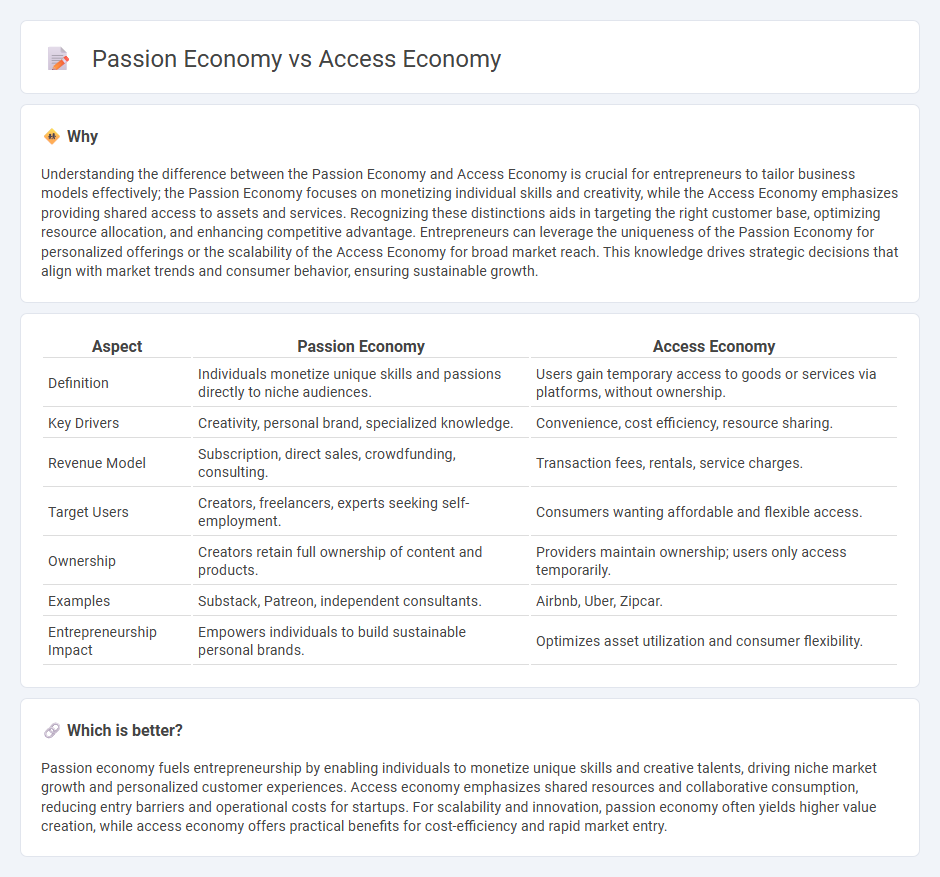
Entrepreneurship today is shaped by the evolving dynamics of the passion economy, where creators monetize unique skills and personal brands, contrasted with the access economy, which prioritizes sharing resources and services through platforms like Airbnb and Uber. The passion economy empowers individuals to build niche businesses by leveraging digital tools and community engagement, while the access economy focuses on maximizing asset utilization and convenience. Discover how these economic models transform entrepreneurial opportunities and redefine value creation.
Why it is important
Understanding the difference between the Passion Economy and Access Economy is crucial for entrepreneurs to tailor business models effectively; the Passion Economy focuses on monetizing individual skills and creativity, while the Access Economy emphasizes providing shared access to assets and services. Recognizing these distinctions aids in targeting the right customer base, optimizing resource allocation, and enhancing competitive advantage. Entrepreneurs can leverage the uniqueness of the Passion Economy for personalized offerings or the scalability of the Access Economy for broad market reach. This knowledge drives strategic decisions that align with market trends and consumer behavior, ensuring sustainable growth.
Comparison Table
| Aspect | Passion Economy | Access Economy |
|---|---|---|
| Definition | Individuals monetize unique skills and passions directly to niche audiences. | Users gain temporary access to goods or services via platforms, without ownership. |
| Key Drivers | Creativity, personal brand, specialized knowledge. | Convenience, cost efficiency, resource sharing. |
| Revenue Model | Subscription, direct sales, crowdfunding, consulting. | Transaction fees, rentals, service charges. |
| Target Users | Creators, freelancers, experts seeking self-employment. | Consumers wanting affordable and flexible access. |
| Ownership | Creators retain full ownership of content and products. | Providers maintain ownership; users only access temporarily. |
| Examples | Substack, Patreon, independent consultants. | Airbnb, Uber, Zipcar. |
| Entrepreneurship Impact | Empowers individuals to build sustainable personal brands. | Optimizes asset utilization and consumer flexibility. |
Which is better?
Passion economy fuels entrepreneurship by enabling individuals to monetize unique skills and creative talents, driving niche market growth and personalized customer experiences. Access economy emphasizes shared resources and collaborative consumption, reducing entry barriers and operational costs for startups. For scalability and innovation, passion economy often yields higher value creation, while access economy offers practical benefits for cost-efficiency and rapid market entry.
Connection
Passion economy drives entrepreneurs to monetize unique skills and personal brands, leveraging digital platforms that enable direct audience engagement. Access economy complements this by providing infrastructure and services that reduce barriers to entry, such as gig platforms and shared resources, facilitating scalable and flexible business models. Together, they empower entrepreneurs to create value through personalized offerings while efficiently accessing necessary tools and markets.
Key Terms
Platform-based marketplaces
Platform-based marketplaces in the access economy emphasize temporary usage and shared resources, enabling users to rent or access assets like cars, homes, or tools without ownership. In contrast, the passion economy prioritizes individual creators leveraging platforms to monetize specialized skills, content, or personalized services, fostering direct connections with niche audiences. Explore deeper insights into how these economies transform digital marketplaces and creator monetization.
Individual monetization
The access economy centers on monetizing shared assets like vehicles or homes, leveraging platforms for peer-to-peer transactions and maximizing utility. The passion economy, by contrast, empowers individuals to monetize unique skills, content, or personal brands directly, fostering deeper engagement and personalized value creation. Explore the nuances of individual monetization models and how they redefine economic opportunities today.
Peer-to-peer transactions
The access economy emphasizes temporary access to goods or services, facilitating peer-to-peer transactions through platforms like Airbnb and Uber, which connect users and providers efficiently. In contrast, the passion economy centers on individual creators monetizing their unique skills and content directly with their audience, often via platforms such as Patreon or Substack. Explore how peer-to-peer dynamics shape the future of both economies by learning more about their distinct models and impacts.
Source and External Links
Access Economy Alliance: Home Page - The Access Economy is a circular alternative to traditional buying, focusing on sharing, borrowing, and renting goods to reduce waste, carbon emissions, and make items accessible to all, especially in urban settings.
Why the Shared Economy Is Really the Access Economy - Infosys - The access economy leverages digital connections to efficiently share resources and services on demand, transforming traditional ownership and enabling new business models based on access rather than possession.
Open Access Economy - An open access economy is a concept aimed at reorganizing society beyond trade and markets to meet everyone's needs fairly while preserving living systems, promoting a post-market community-based approach.
 dowidth.com
dowidth.com